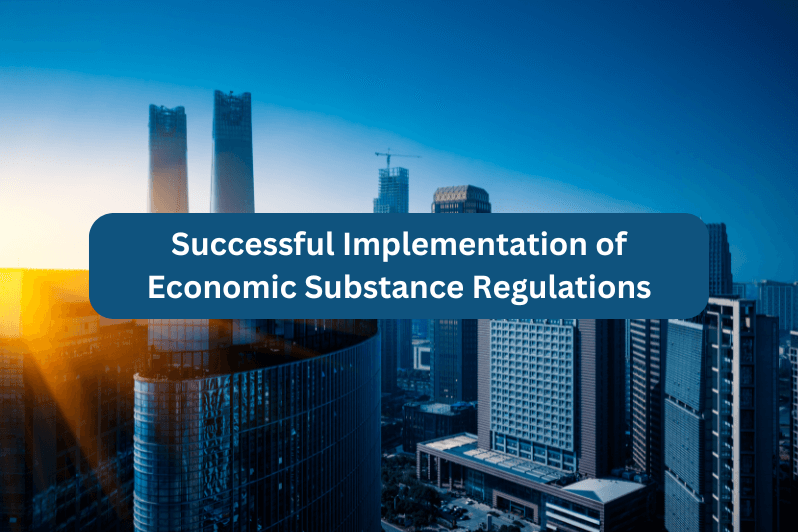The United Arab Emirates (UAE) has embarked on a journey to enhance its economic transparency and comply with international standards through the implementation of Economic Substance Regulations. This commitment is underscored by the formation of a dedicated Permanent Committee, tasked with overseeing the effective execution of these regulations. In this article, we will delve into the intricacies of key strategies laid out by the committee, aiming to ensure the successful implementation of Economic Substance Regulations in the UAE.
1. Coordinated Approach and Standardized Procedures:
The establishment of the Permanent Committee reflects a strategic move towards enhancing collaboration and coordination among diverse regulatory authorities in the UAE. The committee’s focus on fostering a coordinated approach is pivotal for the seamless implementation of Economic Substance Requirements. By harmonizing procedures and standardizing processes, the committee aims to create a unified regulatory framework that streamlines tasks, ensuring efficiency and consistency across regulatory bodies.
2. Proactive Problem Solving:
In the realm of regulatory frameworks, challenges are inherent, and the committee’s proactive problem-solving approach plays a crucial role in overcoming these hurdles. By anticipating potential obstacles, engaging in open dialogue, and collectively formulating practical solutions, the committee ensures that regulatory authorities are equipped to navigate challenges effectively. Regular communication among committee members serves as a vital mechanism for identifying issues promptly and implementing timely solutions.
3. Efficient Exchange of Information:
The committee’s emphasis on creating an efficient mechanism for the exchange of information underscores the importance of seamless communication. Facilitating not only communication among regulatory authorities but also ensuring a smooth flow of information to the National Assessment Authority is fundamental. This structured information exchange system is integral for accurate assessments of economic substance and, subsequently, for maintaining compliance with international standards.
4. Responsive Member Representatives:
The representatives of member authorities serve as key enablers in the implementation process. Their active participation in committee meetings, prompt communication with respective entities, and coordination to address inquiries are pivotal responsibilities. The development and execution of action plans to prepare entities for Economic Substance Requirements, coupled with timely responses to inquiries, contribute significantly to the overall success of the implementation process.
5. International Cooperation and Compliance:
Economic Substance Regulations necessitate interactions on an international scale, and the committee recognizes the importance of proactive engagement. Member representatives are tasked with actively participating in international interactions, such as interviews and responses to questionnaires from bodies like the OECD and the European Union. This commitment not only ensures regulatory compliance but also solidifies the UAE’s reputation as a responsible global player committed to transparency in economic practices.
6. Awareness and Training:
The committee, in collaboration with the Ministry of Finance, assumes a vital role in educating entities subject to Economic Substance Regulations. Organizing workshops and developing a comprehensive media plan contribute to raising awareness about relevant resolutions. Empowering stakeholders with the necessary knowledge enables them to navigate the implementation process effectively, fostering a heightened understanding of regulatory requirements within a broad audience.
7. Effective Meeting Management:
The success of the committee hinges on well-orchestrated meetings characterized by regularity, clear agendas, and efficient decision-making processes. Virtual meeting capabilities using modern technology ensure accessibility and broad participation. Adherence to established protocols for voting and meticulous recording of minutes promotes transparency and accountability, essential elements in the effective management of committee proceedings.
8. Robust Secretary Duties:
The committee’s secretary plays a pivotal role in facilitating smooth operations, from logistical aspects like sending invitations to the comprehensive task of preparing meeting agendas and transcribing minutes. Embracing modern means for recording and signing minutes not only enhances efficiency but also ensures accuracy in maintaining records. The secretary’s duties are indispensable for effective communication and documentation within the committee.
9. Periodic Reporting:
The committee’s commitment to submitting periodic reports to the Ministry of Finance serves as a cornerstone for transparency and accountability. These reports, offering a comprehensive overview of work accomplished, challenges faced, and solutions implemented, keep the Ministry well-informed about the progress of Economic Substance Regulations implementation. Transparent reporting contributes to a collaborative and informed regulatory environment.
10. Continuous Monitoring and Adaptation:
A dynamic approach to continuous monitoring ensures the committee’s relevance and effectiveness. By following up on recommendations, assessing strategy effectiveness, and adapting to evolving regulatory requirements, the committee demonstrates a commitment to ongoing improvement. This proactive stance positions the UAE at the forefront of international compliance standards, showcasing a dedication to economic transparency and adaptive governance.
The establishment of the Permanent Committee and the strategies outlined herein reflect the UAE’s dedication to the successful implementation of Economic Substance Regulations. Through coordinated efforts, proactive problem-solving, and international cooperation, the UAE aims to not only meet regulatory requirements but also set a standard for responsible global economic practices. Entities subject to these regulations are encouraged to actively engage with the committee’s initiatives, thereby contributing to the nation’s continued adherence to international compliance standards and the promotion of economic transparency.

